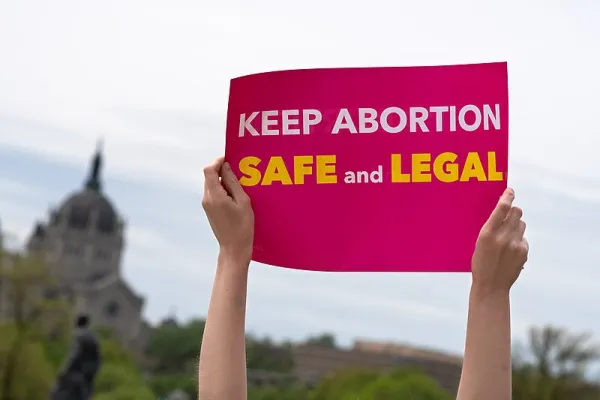“The inescapable conclusion is that a right to abortion is not deeply rooted in the Nation’s history and traditions. On the contrary, an unbroken tradition of prohibiting abortion on pain of criminal punishment persisted from the earliest days of the common law until 1973.”
What could be more convincing than that? The words are part of Samuel Alito’s majority opinion in the recent SCOTUS ruling overturning a woman’s right to an abortion. Apparently human evolution stopped in . . .1789.We — in particular, women, people of color — are prisoners of the past, when slavery was the law of the land, when women couldn’t vote. America, America, land of white male dominance and ignorance. Thank God for the constitutional originalists, who do what they must to keep that ignorance viable, to keep us anchored to the certainties of the old days.
These are the certainties that shape the world, that keep militarism alive, that keep the prison system alive — speaking of which, 11 states still allow the barbaric practice known as “shackling” within the system: handcuffing and chaining incarcerated pregnant women, including when they are, God help us, in labor. The cruel absurdity of this practice is almost beyond comprehension. And it hasn’t been that long ago that it was situation normal throughout the country.
I first wrote about it in 2004, when Arkansas became the second state — following Illinois — to ban shackling, after an Amnesty International report came out that included stories like this, from a woman’s experience at Chicago’s Cook County Jail:
“I was in labor for almost 12 hours. I asked the officer to disconnect the leg iron from the bed when I needed to use the bathroom, but the officer made me use the bedpan instead. I was not permitted to move around to help the labor along. …
“When I felt the baby come) the doctor called for the officer, but the officer had gone down the hall. No one else could unlock the shackles, and my baby was coming but I couldn’t open my legs.”
Recently Tennessee banned such practices, thanks to the activism of women in the state, many of whom endured the horror of shackling personally. The reason given for this practice is that a woman in labor who is unrestrained during the birth process might try to escape. She’s cuffed while in the ambulance to the hospital, cuffed and chained while on the hospital bed. After the birth, the baby is taken away. There’s a male dominance going on here that’s stunningly clueless about the nature of life, from the point of view not only of women but of infants.
Free Hearts, one of the organizations that pushed Tennessee to ban shackling, is also pushing other, related legislation, including, as Victoria Law writes, “a proposal to ban solitary confinement for all pregnant people, since Tennessee has no restrictions against subjecting pregnant people to this practice, which has been proven to negatively affect people’s physical and mental health. For pregnant people, isolation and the inability to walk or exercise also carry negative effects on the development of the fetus.”
As I read this, I couldn’t stop squirming with frustration and incredulity. This is bureaucratic discipline created in a man’s world, with zero sense of the complex vulnerability of a pregnant woman’s life — or of life itself.
Add to this a further bit of data: National Public Radio and Northwestern University’s Medill School of Journalism, some years back, gathered data from prisons around the country and learned that “women were disciplined two to three times more often than men for more minor violations of prison rules. Women were more likely to get punished for nonviolent and often subjective violations, like disobeying or talking back to a corrections officer.”
One woman, for instance, “says she once was placed in solitary confinement for three months after making an unauthorized phone call to her 10-year-old daughter.”
Excuse me. Something feels strange here, a hovering dominance, you might say — especially in the wake of the Supreme Court’s overturning of Roe v. Wade, throwing abortion rights open to the states. Somehow this anti-choice ruling doesn’t feel like reverence for life, but rather reassertion of control, a.k.a., patriarchy. A pregnant woman, even if she’s not in jail — even if she’s the victim of rape — has to do what she’s told: Carry that baby to term. If she doesn’t, she will be in jail. Or worse.
Beyond the confiscation of women’s rights, I feel something else missing: a valuing — an understanding — of life itself, of giving birth, of nurturing and giving love to a child. Men must be part of this, but they shouldn’t pretend to have control over it, anymore than they have control over a woman’s body. I speak as a dad, profoundly fortunate to have been part of the birth of my daughter, present as a Lamaze-trained helper during labor and delivery. The entirety of my focus was helping my wife through her ten-hour struggle to give birth, then dancing for five minutes as I held the newborn in my arms.
The state’s historical relationship to pregnancy and birth, and to the life of women, has been, to a large extent, authoritarian, controlling and ignorant, evincing neither understanding nor respect. Thus digging though history for precedent — that is, for justification — in regard to abortion, as Alito and the SCOTUS five did, is basically an ideological cover.
What the state must do is learn and evolve, maintaining what Morgan Marietta called a “living Constitution,” continually expanding the extent to which it understands life and values all of its citizens — by honoring who they are and what they need, by sustaining a tradition of unshackled choice.
Robert Koehler is an award—winning, Chicago—based journalist and nationally syndicated writer. His book, Courage Grows Strong at the Wound is available. Contact him or visit his website at commonwonders.com.
© 2022 TRIBUNE CONTENT AGENCY, INC.



